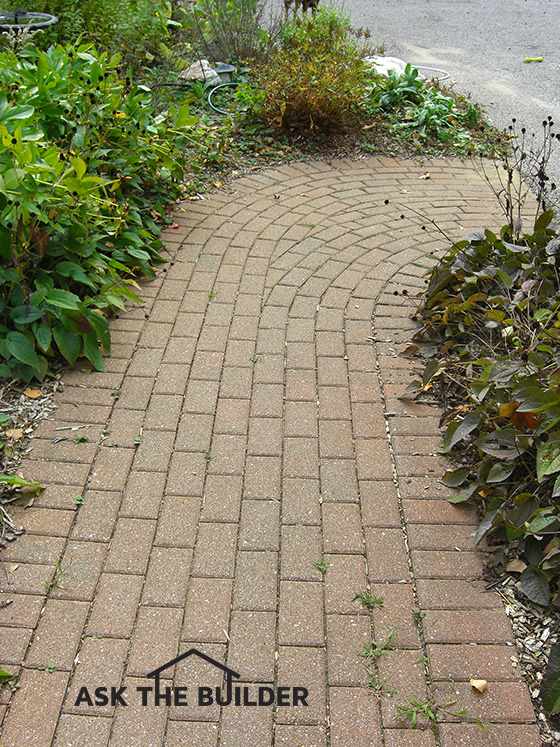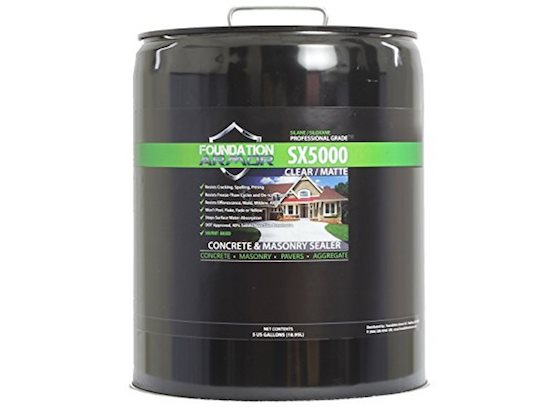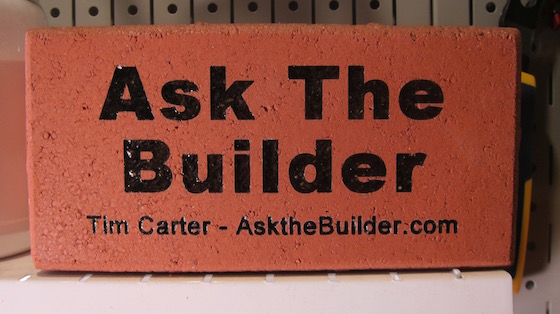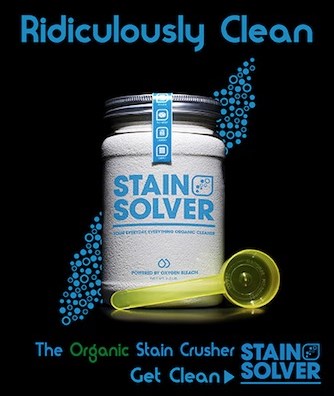Brick Pavers

This brick paver sidewalk has endured severe frost heave, snow, ice and heavy traffic. It can take lots of punishment. It's Achilles heel is that the color fades over time. This sidewalk was a deep brown when installed and now is very light in color. ©2017 Tim Carter
Brick Pavers TIPS
- Concrete or clay - big differences
- Concrete fades - impossible to re-tint
- Clay is colorfast forever
- WATCH videos below
- CLICK HERE to Get Tim's FREE & FUNNY Newsletter!
DEAR TIM: It’s time to replace our sidewalk, and I’m leaning towards brick pavers. Before I invest this money, I’d like to know as many pros and cons about this building material.
Should I use clay brick pavers? I’m also interested in different brick paver designs and ideas. What brick pavers would you use and why? Leslie W. Tacoma, WA
DEAR LESLIE: I’ve installed my fair share of brick paver sidewalks in my lifetime.
Brick Is Timeless
I’ve also used them with great success on large patios and steps. At my last home, every person who saw our front brick sidewalk and our two brick paver patios always commented on how gorgeous they were.
Color & Texture
I truly believe that brick pavers make a great sidewalk because they are so distinctive. The color, texture and sheen of the brick are so unlike concrete, perhaps the most common sidewalk material.
Natural stone can also create a unique sidewalk look, but it’s often the most expensive paving option.
Clay & Concrete
There are two primary types of brick pavers in my opinion: clay brick and concrete brick. Decades ago the rage was to install colored concrete brick pavers that required no mortar. They interlocked with one another and could withstand all that Mother Nature could dish out if they were made correctly.
Newer Shapes & Patterns
This paving product is maturing and the designs, colors, shapes of the concrete brick continue to expand. One advantage of this material is that you can have a new sidewalk installed and completed in hours not days. That might be a major consideration for you.
Concrete Color Fades
But understand that the color of these concrete paving brick will change and fade over time. Guaranteed.
And the fading gets worse by the year.
Pigments & Cement Paste
The color is achieved by adding pigments to the concrete mix. These pigments become part of the cement paste that coats the sand and gravel in the brick.
But over time, this ultra-thin cement paste on the top surface of the brick wears off exposing the true color of the sand and gravel. You may not like that faded color in two, five or ten years. Realize that the sun's ultraviolet (UV) light will also work to break down the pigments that are in between the sand grains causing further fading.
Paver Patio Brick Video
Watch this video for a few tips.
32 F
Climate is a big factor with brick sidewalks. Brick pavers in Tampa, Florida, and other warm climates that never see freezing temperatures, will survive longer than brick of any type in a cold, freezing climate.
If you use concrete brick, you should consider a brick paver sealer every few years to minimize water penetration into the concrete brick. CLICK HERE to get a fantastic one that's made with silanes and siloxane ingredients.

This is a magnificent silane - siloxane water repellent that soaks into concrete. CLICK THIS IMAGE NOW TO ORDER IT.
Clay = Colorfast
I prefer thin brick pavers made from real clay. The color of the material is solid through the entire brick.
Purchase ones that have been made for cold climates, and they’ll last for possibly over 100 years. The hotter the kiln and the longer the brick are left in the kiln, the harder they get. These will have a SW rating from the manufacturer. The SW stand for severe weathering.
Athens Ohio Brick
You can see paving brick used in roadways that are well over 100 years old in many cities. Athens, Ohio is one that comes to mind as my oldest daughter went to college there.
While walking across the roads there, I had lots of images of the workers installing brick pavers well over a hundred years ago. Even after being scraped with city snow plows and abused by heavy trucks, many of the brick look like they just came from the brick manufacturer. This tells you that clay brick can last in your sidewalk.
Infinite Designs
Brick paver designs are as plentiful as cobs of corn in a farmer’s field. A clever installer can install a serpentine sidewalk for you. Curves are no issue.
If you prefer a more geometric design like herringbone or crosshatching you might see in a cane chair, that’s also possible. Many brick manufacturers have great photography of how their brick can be used to create more patterns and designs than you can imagine.
Engraved Brick
If you want to go all out and make your sidewalk very distinctive, consider some engraved brick pavers. Companies use lasers to cut into a brick’s surface and etch any words, names or designs that you might want.

This is a laser etched brick made for me. The detail is incredible. This brick measures 8 inches wide and 4 inches high. So you can see how fine the laser can cut. The laser MELTS the clay turning it to GLASS. The laser etching will last for centuries outdoors unless you beat on it with a hammer. © Copyright 2017 Tim Carter
You could engrave several or many brick that have a welcome message or even some poem that sets the mood as your guests walk up to your front door. The possibilities are endless.
Cheap Price = Cheap Product
As with any product, use caution when looking at wholesale brick pavers or discount brick pavers. Be leery as to where they were made. Brick made in China or some other foreign nation may not be up to our standards.
Unscrupulous businessmen may not care if your brick sidewalk crumbles. Buy brick pavers from an established business in your town. Ask about the weathering index for the brick. Not all brick are made the same.
Cleaning Brick

Stain Solver is MADE in the USA with USA ingredients that are food-grade quality. CLICK THE IMAGE to order some NOW.
Cleaning brick pavers is easy. You can use Stain Solver oxygen bleach solution to remove algae, dirt and mold.
Stain Solver is Made in the USA with USA ingredients. It's non-toxic to nearby plants, trees or expensive landscaping.
It's a powder you mix with water and apply with a garden hand-pump sprayer.
The trick is to apply it to dry brick and allow the Stain Solver solution to bubble and fizz for up to 30 minutes. Keep the brick very wet with the solution.
After waiting, use a stiff push broom or scrub brush on a pole to get the algae off the brick. Rinse with hose water.
Brick Cleaning Video
Watch this video to see how to use Stain Solver to clean algae off clay patio brick.
Chlorine = TOXIC
Avoid chlorine bleach as it is highly toxic to grass, landscaping and trees.
Pressure Washers = BAD for Concrete
Pressure washing will erode the cement paste off of concrete brick, so use those machines with great care.
A pressure washer will not harm a clay brick surface if the brick has a severe-weather rating. This rating certifies the brick is very dense and very hard as a result of being fired in the kiln for a longer time.
Column 851
2 Responses to Brick Pavers